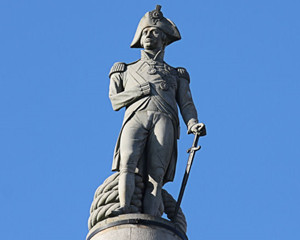It was not, therefore, from any selfish reflection upon the magnitude of our loss that we mourned for him: the general sorrow was of a higher character. The people of England grieved that funeral ceremonies, and public monuments, and posthumous rewards, were all that they could now bestow upon him whom the King, the Legislature, and the Nation would have alike delighted to honour; whom every tongue would have blessed—whose presence in every village through which he might have passed would have awakened the church bells, have given schoolboys a holiday, have drawn children from their sports to gaze upon him, and "old men from the chimney corner" to look upon Nelson ere they died.

The victory of Trafalgar was celebrated, indeed, with the usual forms of rejoicing, but they were without joy; for such already was the glory of the British Navy, through Nelson's surpassing genius, that it scarcely seemed to receive any addition from the most signal victory that ever was achieved upon the seas. The destruction of this mighty fleet, by which all the maritime schemes of France were totally frustrated, hardly appeared to add to our security or strength; for while Nelson was alive to watch the combined squadrons of the enemy, we felt ourselves as secure as now when they were no longer in existence.












